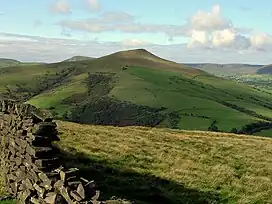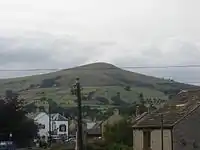Lose Hill
Lose Hill lies in the Derbyshire Peak District. It is the south-east corner of the parish of Edale and the end of the Great Ridge that runs from Rushup Edge to the west (over Mam Tor, Hollins Cross and Back Tor).
| Lose Hill | |
|---|---|
 Lose Hill as seen from approach to Win Hill | |
| Highest point | |
| Elevation | 476 m (1,562 ft) |
| Prominence | 76 m (249 ft) |
| Geography | |
| Location | Peak District, England |
| OS grid | SK153854 |
| Topo map | OS Landranger 110 |
Local access activist G. H. B. Ward was given an area of Lose Hill by the Sheffield and District Federation of the Ramblers Association in 1945, which was named Ward's Piece; he subsequently presented this to the National Trust.[1]

Suggested explanations for the name of Lose Hill include that it derives from the Old English hlose, meaning pigsties, or that it may be a corruption of ‘loose’, as in ‘free land’. Another author (Murray) argues that Lose Hill should actually be called Laws Hill.[2]
In relatively recent times, the two hills' names have prompted a fanciful tale concerning the outcome of an imagined 7th-century battle between the forces of Edwin of Northumbria and Cynegils of Wessex.[3] Edwin's forces occupied Win Hill, while Cynegils' men camped on Lose Hill. As the battle progressed, Cynegils' forces advanced up Win Hill, and Edwin's retreated behind a temporary wall they had built near the summit. They pushed the boulders of the wall downhill, crushing the Wessex soldiers and gaining victory in the battle. However, there is no historical basis for the tale, and no evidence of any battle ever being fought here.
See also
References
- Edwards, Brian (Spring 2001). "A rambler made". Dore Village Society. Archived from the original on 15 October 2008.
- Henderson, Mark P (2011). Folk Tales of the Peak District. Amberley Publishing Limited. ISBN 1445601079.
- Merrill, John N. (1972). Legends of Derbyshire. The Dalesman Publishing Company Ltd. ISBN 0852062729.>
